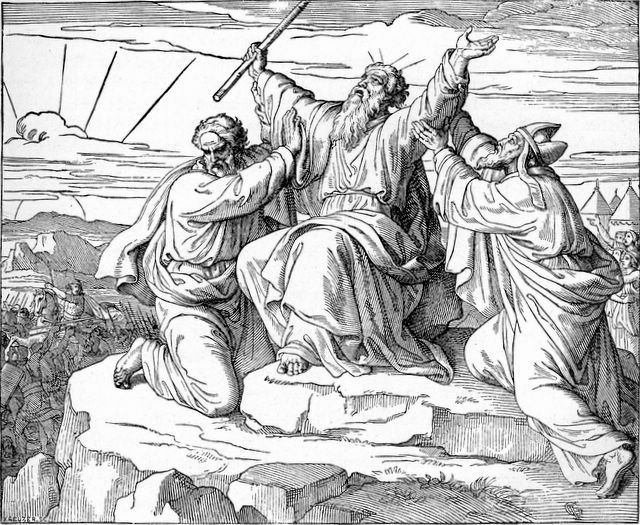
I. What is Prayer?
The apostle Paul, in his first Epistle to Timothy, 2:1, enumerates four species of prayer, saying, “I exhort, therefore, that first of all supplication, prayers, intercessions, and giving of thanks, be made for all men.” The first includes prayers against evil things; the second, petitions for good things; the third, intercession for others; and the fourth, thanksgiving for benefits received and evils warded off. This distinction is drawn from the end or design of prayer.
Prayer consists in calling upon the true God, and arises from an acknowledgment and sense of our want, and from a desire of sharing in the divine bounty, in true conversion of heart and confidence in the promise of grace for the sake of Christ the mediator, asking at the hands of God such temporal and spiritual blessings as are necessary for us; or in giving thanks to God for the benefits received. The genus or general character of prayer consists in invocation or adoration. Adoration is often used in the sense of the whole worship of God, since we regard him as the true God, whom we worship. Prayer is a species or part of invocation, for to call upon the true God is to ask of him such things as are necessary both for soul and body, and to render thanks to him for benefits received. It is here used in the sense of the general character of pray. There are, therefore, two species or parts comprehended in prayer—petition and thanksgiving. Petition is a prayer asking of God those blessings necessary both for the soul and body. Thanksgiving is prayer acknowledging and magnifying the benefits received from God, and binding those who receive these gifts to such gratitude as is pleasing to God. Thankfulness in general consists in acknowledging and professing what and how great is the benefit received, and in binding those who are the recipients thereof to the performance of such duties as are mutual, possible and becoming. It comprehends, therefore, truth and justice.
Prayer is also distinguished into public and private prayer, from the circumstances of person and place. Private prayer is the intercourse which a faithful soul has with God, asking, alone and apart from others, certain blessings for himself, or for others; or giving thanks for benefits received. This form of prayer is not restricted to any particular words or places, for oftentimes the heart, when burdened and distressed, gives utterance to nothing more than sighs and groans; and the Apostle commands “that men pray every where, lifting up holy hands.” (1 Tim. 2:8.) Public prayer is that which, by the use of certain words, is offered up to God by the whole church in the congregation, the minister leading, as it is right and proper that he should in the public gatherings of the church. Language, or the use of the tongue, is necessary for this form of prayer. Hence Christ said: When ye pray, say, Our Father, &c. It was also chiefly for this that the tongue was made, that God might be praised and magnified by it; and it is out of the abundance of the heart that the mouth speaketh. Lastly, by this others are also invited to praise and worship God.
Ursinus, Zacharias, and G. W. Williard. 1888. The Commentary of Dr. Zacharias Ursinus on the Heidelberg Catechism. Cincinnati, OH: Elm Street Printing Company.
Exodus 17:8–12 (KJV)
8 Then came Amalek, and fought with Israel in Rephidim. 9 And Moses said unto Joshua, Choose us out men, and go out, fight with Amalek: to morrow I will stand on the top of the hill with the rod of God in mine hand. 10 So Joshua did as Moses had said to him, and fought with Amalek: and Moses, Aaron, and Hur went up to the top of the hill. 11 And it came to pass, when Moses held up his hand, that Israel prevailed: and when he let down his hand, Amalek prevailed. 12 But Moses’ hands were heavy; and they took a stone, and put it under him, and he sat thereon; and Aaron and Hur stayed up his hands, the one on the one side, and the other on the other side; and his hands were steady until the going down of the sun.
Moses grew weary, and then his friends assisted him. When at any time your prayer flags, let faith support one hand, and let holy hope uplift the other, and prayer seating itself upon the stone of Israel, the rock of our salvation, will persevere and prevail. Beware of faintness in devotion; if Moses felt it, who can escape? It is far easier to fight with sin in public, than to pray against it in private. It is remarked that Joshua never grew weary in the fighting, but Moses did grow weary in the praying; the more spiritual an exercise, the more difficult it is for flesh and blood to maintain it. Let us cry, then, for special strength, and may the Spirit of God, who helpeth our infirmities, as He allowed help to Moses, enable us like him to continue with our hands steady “until the going down of the sun;” till the evening of life is over; till we shall come to the rising of a better sun in the land where prayer is swallowed up in praise.



